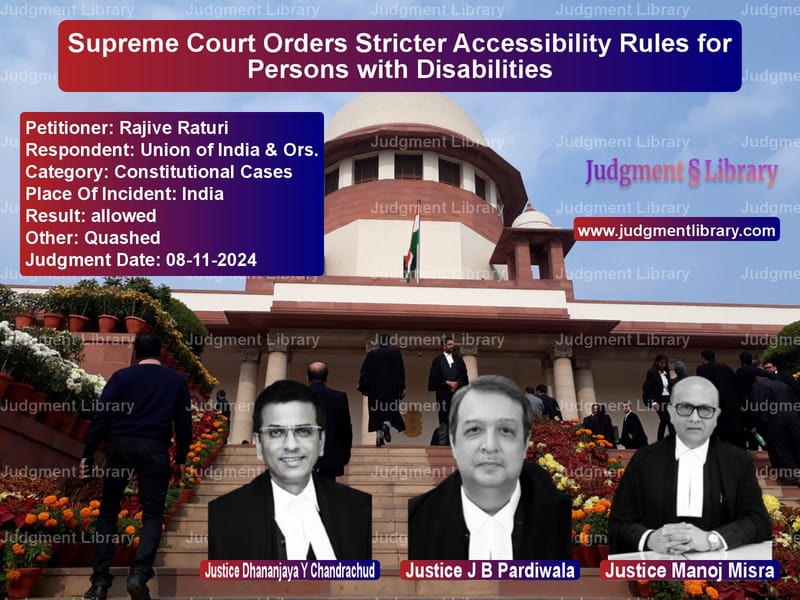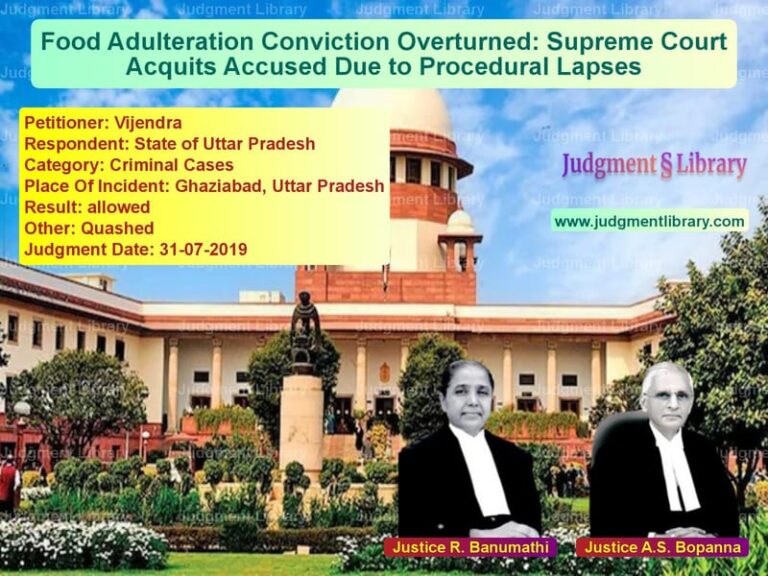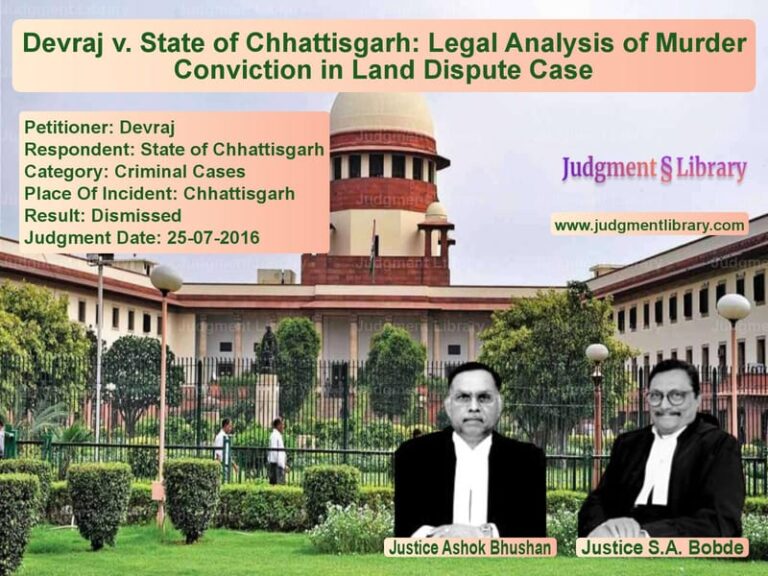Supreme Court Orders Stricter Accessibility Rules for Persons with Disabilities
The Supreme Court of India, in a landmark ruling in Rajive Raturi vs. Union of India & Ors., reinforced the right to accessibility for persons with disabilities (PWDs) and directed the government to implement stricter rules ensuring equal access to public infrastructure, transport, digital services, and education.
Background of the Case
The case was initiated by Rajive Raturi, a visually challenged human rights activist, in 2005, seeking improved accessibility measures in public spaces. The petition aimed to ensure compliance with the Rights of Persons with Disabilities Act, 2016 (RPWD Act), and the Accessible India Campaign.
Despite a previous Supreme Court judgment in 2017 outlining eleven action points for accessibility, state and central governments had failed to fully implement these directives. The court, therefore, assigned NALSAR University’s Centre for Disability Studies (NALSAR-CDS) to assess compliance.
Key Legal Issues
- Whether existing accessibility rules under the RPWD Act were enforceable.
- Whether a lack of accessibility standards violated the fundamental rights of PWDs.
- Whether failure to implement accessibility guidelines justified court intervention.
- Whether states and union territories should be held accountable for non-compliance.
Arguments by the Parties
Petitioner’s Arguments
- Accessibility is a fundamental right under Articles 14, 19, and 21 of the Constitution.
- State and central governments had failed to comply with the 2017 judgment, delaying implementation of essential accessibility measures.
- The existing RPWD Rules were not enforceable as they were mere guidelines, rather than mandatory provisions.
- Infrastructure and services for PWDs remained inadequate, leading to systemic discrimination.
Government’s Response
- The government argued that implementation required gradual progress under a “progressive realization” model.
- Some states had made improvements, including accessible buses and modifications to buildings.
- Existing RPWD Rules provided sufficient legal backing for accessibility but required better enforcement.
Supreme Court’s Analysis
1. Right to Accessibility as a Fundamental Right
The Court reaffirmed that accessibility is not a privilege but a fundamental right. The judgment stated:
“Accessibility is essential to ensure that persons with disabilities can exercise their rights meaningfully. The failure of authorities to implement accessibility measures violates Articles 14 and 21 of the Constitution.”
2. Non-Enforceability of RPWD Rules
The Court found that the RPWD Rules lacked enforcement mechanisms. It observed:
“The RPWD Act mandates accessibility, but its corresponding rules only provide guidelines rather than mandatory regulations. This ambiguity has led to non-compliance.”
3. Government’s Failure to Act
The Court criticized the government’s inaction, stating:
“The indifferent attitude of the State and Union Territories demonstrates a lack of seriousness in complying with accessibility laws.”
4. Directive for Mandatory Accessibility Rules
The Court directed the government to:
- Formulate mandatory accessibility rules within three months.
- Ensure new buildings cannot receive clearances unless they comply with accessibility standards.
- Retrofit existing buildings and transport systems within a reasonable timeline.
- Implement penalties for non-compliance under Section 89 of the RPWD Act.
Final Judgment
- The Court ruled that Rule 15 of the RPWD Rules was ultra vires (beyond legal authority) and must be replaced with enforceable rules.
- The government was given three months to notify new accessibility standards.
- NALSAR-CDS was directed to assist in formulating the new standards.
- The Union Ministry of Social Justice and Empowerment was ordered to pay ₹50 lakh to NALSAR-CDS for their study.
Implications of the Judgment
- Stronger Legal Framework: Accessibility standards will now be legally binding.
- Accountability for Non-Compliance: Governments will face penalties if they fail to implement accessibility measures.
- Better Infrastructure for PWDs: Public spaces, transport, and digital services must be designed to be inclusive.
- Recognition of Disability Rights: The ruling reinforces that accessibility is essential for equality and dignity.
This landmark ruling sets a precedent for disability rights, ensuring greater inclusivity and compliance with accessibility standards in India.
Petitioner Name: Rajive Raturi.Respondent Name: Union of India & Ors..Judgment By: Justice Dhananjaya Y Chandrachud, Justice J B Pardiwala, Justice Manoj Misra.Place Of Incident: India.Judgment Date: 08-11-2024.
Don’t miss out on the full details! Download the complete judgment in PDF format below and gain valuable insights instantly!
Download Judgment: rajive-raturi-vs-union-of-india-&-ors-supreme-court-of-india-judgment-dated-08-11-2024.pdf
Directly Download Judgment: Directly download this Judgment
See all petitions in Fundamental Rights
See all petitions in Public Interest Litigation
See all petitions in Constitution Interpretation
See all petitions in Separation of Powers
See all petitions in Judgment by Dhananjaya Y Chandrachud
See all petitions in Judgment by J.B. Pardiwala
See all petitions in Judgment by Manoj Misra
See all petitions in allowed
See all petitions in Quashed
See all petitions in supreme court of India judgments November 2024
See all petitions in 2024 judgments
See all posts in Constitutional Cases Category
See all allowed petitions in Constitutional Cases Category
See all Dismissed petitions in Constitutional Cases Category
See all partially allowed petitions in Constitutional Cases Category







